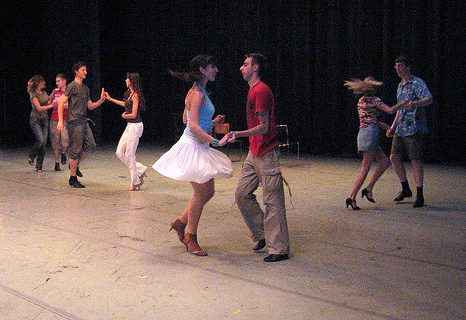Revised as of
22 Nov 2022
I thought this would be an easy Word Confusion to write up. I should’ve taken Murphy’s law into account, as “Gibe vs Jibe vs Jive . . . and a Gybe” is one of the more complex ones — it started with jibe and jive but the more I researched, more complexities surfaced.
Part of that complexity is that gybe is the British spelling of gibe/jibe, AND gybe only refers to the nautical definition. Talk about specific!
The more complex issue is the differences between gibe and jibe with some dictionaries claiming that the two words are essentially the same. However, more dictionaries specify that gibe is more about the taunt . . . and only the taunt.
Jibe is primarily sailing and agreement. Except there’s that alternative spelling issue. Your best bet? Use gibe to taunt and jibe to sail or agree.
As for jive, it’s all about the jazz — music, dancing, or slang by jazz musicians. When it comes to taunt, it’s more a case of nonsense talk than putting someone down. Again a few dictionaries state that jive is also about taunting, but more claim it’s about the teasing. As for including agree as part of the jive definition, it’s a common confusion. And wrong.
Taunt: A remark made in order to anger, wound, or provoke someone.
Tease: Make fun of or attempt to provoke a person or animal in a playful way.
Word Confusions . . .
. . . started as my way of dealing with a professional frustration with properly spelled words that were out of context in manuscripts I was editing as well as books I was reviewing. It evolved into a sharing of information with y’all. I’m hoping you’ll share with us words that have been a bête noire for you from either end.
If you found this post on “Gibe vs Jibe vs Jive…and a Gybe” interesting, consider tweeting it to your friends. Subscribe to KD Did It, if you’d like to track this post for future updates.
| Gibe | Gybe | Jibe | Jive |
|---|---|---|---|

Young Bucks Taunt by Anton Jackson is under the CC BY-SA 2.0 license, via VisualHunt. — It’s one gibe after another from this pair. |

Towards the Gybe Mark by Adam McElroy is under the CC BY-NC 2.0, via VisualHunt. |

JIBE courtesy of JOG yacht racing is under the CC BY-NC 2.0 license, via VisualHunt. — The boat is jibing, and it seems that the crew has jibed about where to sit. |

Jive by Jan Kaláb is under the CC BY-SA 2.0 license, via Flickr. |
| Part of Grammar: | |||
| Noun; Verb, intransitive & transitive Plural for the noun: gibes Third person present verb: gibes Alternate spelling: gybe, jibe |
British
Noun; Verb, intransitive & transitive Plural for the noun: gybes Third person present verb: gybes Alternate spelling: gibe, jibe |
Noun 1, 2; Verb 1, intransitive 3 & transitive Plural for the noun: jibes Third person present verb: jibes Alternate spelling: gibe, gybe, jib, jibb |
Adjective; Noun; Verb, intransitive & transitive Plural for the noun: jives Third person present verb: jives |
| The taunt
Noun: An act or instance of gibing [Or jibe] An insulting or mocking remark
A pointy comment, an insult, a verbal thump on the forehead Verb, intransitive:
Verb, transitive:
|
Nautical only
Noun: An instance of gybing Verb, intransitive: To cause a sailing vessel to gybe [Sailing; of a sailing vessel] To undergo gybing Verb, transitive: |
Nautical or agreement
The taunt can be spelled gibe, but it’s not an acceptable spelling. Noun: An act or instance of jibing 1 [Or gibe] An insulting or mocking remark 2
Verb, intransitive:
[Or gibe] Make insulting or mocking remarks 2
[North American; informal] Be in harmony or accord 3
Verb, transitive: Taunt
|
Deceptive, deceitful AND a type of dance as well as slang among musicians. While a taunt like gibe, it’s more of a tease Adjective: [North American; informal] Deceitful or worthless Noun:
[Also jive talk] A form of slang associated with black American jazz musicians
Verb, intransitive:
Talk nonsense Verb, transitive:
|
| Examples: | |||
| Noun: It was a gibe at his old rivals. “The last sentence was spoken in taunting tones, and Slade’s face showed that the gibe had gone home” (Landon). But that gibe is now out-of-date. “Dr. Prince walked off very triumphantly after this parting gibe” (Delafield). Verb, intransitive: The maids looked at one another and laughed, while pretty Melantho began to gibe at him contemptuously. She set Eurymachus son of Polybus on to gibe at him, which made the others laugh. If, again, war were to break out this day, give me a shield, a couple of spears, and a helmet fitting well upon my temples — you would find me foremost in the fray, and would cease your gibes about my belly. It’s impolite to gibe at a foreign student’s English. It’s easy enough for you to gibe at them, but could you do any better? That hurt, too, just like his gibe about the professor. Verb, transitive: Can you gibe me a better deal? |
Noun: “So they ran before it largely till the bows were pressed right under, and it was no human poser that saved the gybe” (Belloc). Verb, intransitive: He “was the most amazed when he saw me work the boat to and again in the sea by the rudder, and how the sail gybed, and filled this way or that way as the course we sailed changed.” – Daniel Defoe “The cutter had lost all four foremost men by the violent gybing of a boom.” Charmed Life is equipped with a refrigerator, a freezer, and a microwave, so the women can zap their meals between gybing, tacking, and swabbing decks. We are currently on a port gybe and will probably have to gybe twice more before we can get lined up for the final dash to the finish. Many an hour was spent tacking, gybing, and splicing the main brace with the occasional capsize as well. On the second day, we practiced gybing, or passing the boat’s backside through the wind. They gybed, and the boat turned over. Verb, transitive: For starters it doesn’t fly from a spinnaker pole, which makes setting and gybing the sail simple. Due to the fact that you are gybing the sail this way you will need to pull hard and fast on the new leeward sheet to trim the sail in on the new tack and course. When the breeze picked up to 35 kts we dropped the spinnaker, gybed, set the headsail, and started heading back inshore to catch the cold front moving in from the southwest. Careful control of the boom and mainsail is required when gybing in order to prevent a violent motion of the boom when it switches sides. |
Noun: On the way some had salutations for her and some had gibes. His replies were peppered with small jibes. But a caring family couldn’t totally protect the young Alíesha from the jibes and taunts of schoolmates and soldiers. That was until the jibes become too much for me. It was a cheap jibe about his loss of hair. It was a jibe at his old rivals. Some cynics in the media might jibe. Verb, intransitive: We were lying head to north-west, and it was his intention to jibe over all with the first puff. Be vigilant about an accidental jibe. The boom is given to a violent move when we jibe. It is all very well for Tariq Ali to jibe at India’s neo-liberal economics, but this, alas, is the only show in town. Today one can easily jibe at the show’s glaring seams and stitches. The verdict does not jibe with the medical evidence. The report does not quite jibe with the commissioner’s observations. Verb, transitive: With a bit of practice, you can steer, turn, tack, and jibe a boat with just her sails. (Jamieson) |
Adjective: But it’s still a big jive turkey in need of a valuable lesson. We all still have Zoidberg, but we all are jive turkeys. That boy be talkin’ jive nonsense. Noun: Gloria and her husband still enjoy a bit of a bop and a jive. Miller’s distinctive big band timbre is the sound of a generation: swing and jive, romance and sweet sentiment, people and places. But what he found when he went to Johannesburg convinced him that an entire album could be built around township jive. He shops for disco clothes and plaid pants, gets an Afro wig, and starts talking jive. It’s a nice portrait of Strummer the hipster, talking his jive talk and dropping the needle on U Roy records to a worldwide audience. Scott Hudson was freaking hilarious talking in carny jive when interviewing them. There are beautiful teens with bored expressions, belied by their enthusiastic jive. Don’t give me any of that jive! A single image says more than any amount of blather and jive. Unfortunately, the good former Senator was talking jive. Oh man, these people are all around us making joke after joke, jive after jive, pun after pun, all in a vain attempt to elicit laughter. Verb, intransitive: Everybody seemed to be enjoying themselves, dancing and jiving about. They had a CD of Christmassy tunes set to standard dance rhythms, and jiving to Slade was most enjoyable! He wasn’t jiving about that bartender. The very nature of God-given expression makes room for people to hum, pluck, and jive while having concerns over society’s woes. Her facial expressions did not jive with what she was saying. Verb, transitive: Stop jiving me! I turned the corner and, I jive you not, the first person I saw was Lamps. |
| Derivatives: | |||
| Adverb: gibingly Noun: giber |
Adjective: jibing Adverb: jibingly Noun: jiber Verb: jibing |
Adjective: jivey, jivier, jiviest, jivy Noun: jiver |
|
| History of the Word: | |||
| Mid-16th century (as a verb), meaning to make a remark that is taunting or sarcastic, perhaps from the Old French giber meaning handle roughly (in modern dialect kick).
Soon after, gibe was used as a noun referring to the remark. |
Late 17th century, from the obsolete Dutch gijben (now gijpen), is of obscure origin, and only applied to the nautical definition of gibe or jibe. |
|
1920s and originally American denoting meaningless or misleading speech. It is of unknown origin.
1940s, the later musical sense jazz gave rise to dance performed to jazz |
C’mon, get it out of your system, bitch, whine, moan . . . which words are your pet peeves? Also, please note that I try to be as accurate as I can, but mistakes happen or I miss something. Email me if you find errors, so I can fix them . . . and we’ll all benefit!
Satisfy your curiosity about other Word Confusions on its homepage or more generally explore the index of self-editing posts. You may also want to explore Book Layout & Formatting Ideas, Formatting Tips, Grammar Explanations, Linguistics, Publishing Tips, the Properly Punctuated, Writing Ideas and Resources, and Working Your Website.
Resources for Gibe vs Jibe vs Jive . . . and a Gybe
Some of these links may be affiliate links, and I will earn a small percentage, if you should buy it. It does not affect the price you pay.
Apple Dictionary.com
Belloc, Hilaire. Hills and the Sea. Ebook. <https://amzn.to/3QJJ0vt>.
Delafield, E.M. Delphi Collected Works of E. M. Delafield US (Illustrated) <https://amzn.to/3gwS4Yf>.
Dictionary.com: gybe, jibe and jive
The Free Dictionary: gibe
Jamieson, John. “Something About Me and My Book.” The Book Marketing Network. n.d. Web. n.d. <http://thebookmarketingnetwork.com/profile/JohnJamieson>.
Landon, Herman. The Gray Phantom. Project Gutenberg, 2011. Originally published 1921. <https://www.gutenberg.org/ebooks/37913>. Ebook.
Merriam-Webster: gybe
Optic, Oliver. The Yacht Club. 2012. Ebook. <https://amzn.to/3S8ceFn>.
Oxford Dictionaries: jive
Vocabulary.com: gibe-jibe, jibe
Vocabulary Words: gibe <https://vocabulary-words.com/gibe/>
Pinterest Photo Credits:
Astaire-Hayworth Dancing by Columbia Pictures and Comante Taunt, a trailer from Scarface, are both in the public domain, via Wikimedia.com. Image from page 70 of Our Young Folks, <https://visualhunt.com/f2/photo/14579527058/28afd71f1d/>, a serial from 1865, is courtesy of Internet Archive Book Images and has no known copyright restrictions, via VisualHunt.


